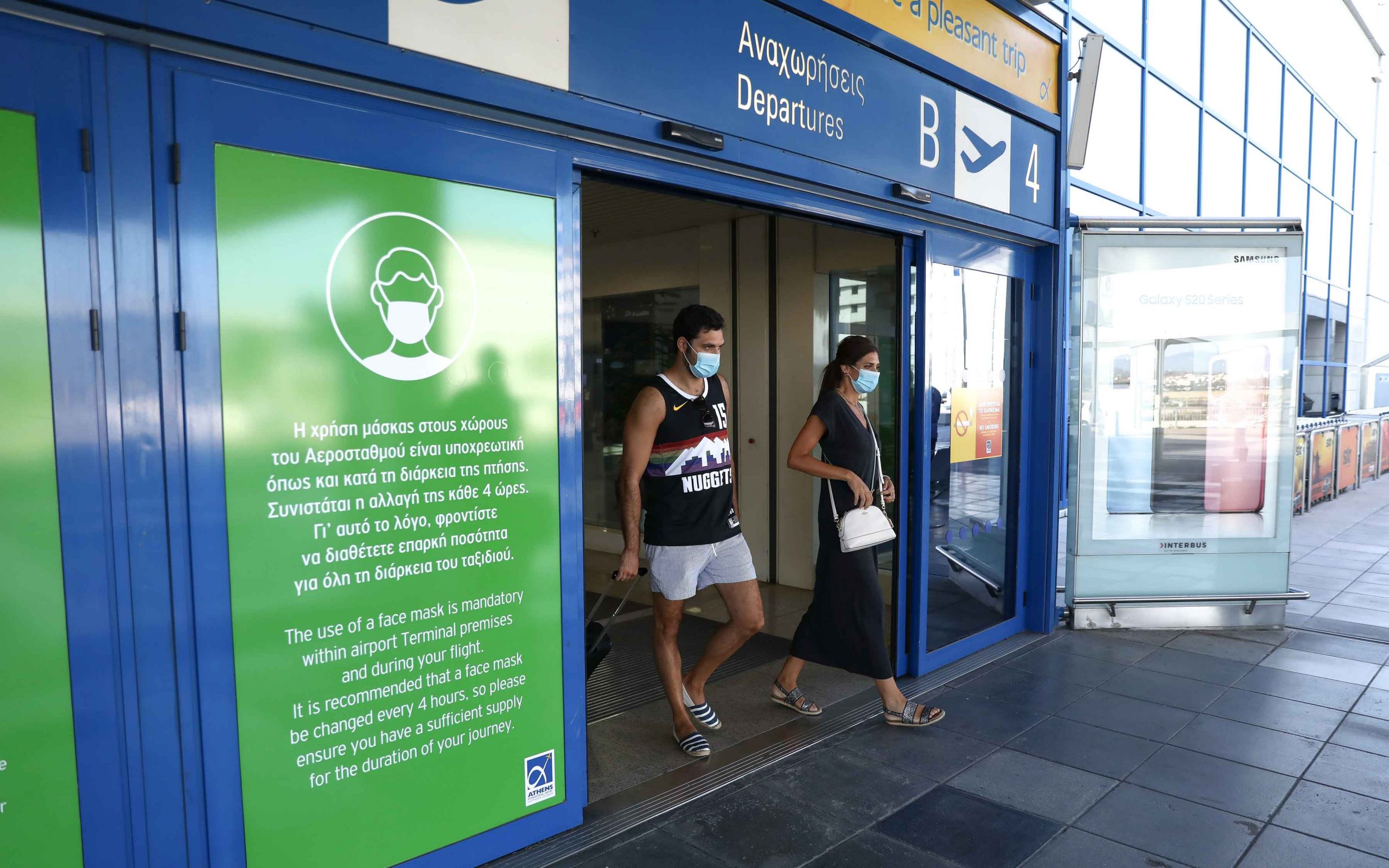A Summer Visit to the Acropolis: What Tourists...
Tourists share the highs and lows...

Diving into the sparkling water off Samos island.
© Nikos Chatziiakovou
Last edited on June 28th, 2021: The government has announced that as of June 30, all travelers arriving from Russia will need to provide a a negative PCR test or a rapid test, whether or not they are vaccinated. They will also have to undergo another test upon their arrival.
After more than a year of staying home, the urge to get away to a beach, a taverna and a cocktail bar is stronger than ever. Greece has declared itself open for tourism, but how complicated is it to travel, and is everyone allowed? Below we have tried to answer all of the most basic questions you are asking about traveling to Greece right now.
Remember, the information provided here is accurate for the time of publication of this article, but may change rapidly as the state of the pandemic remains fluid.
A vaccination certificate is one of three alternative documents you can use to demonstrate that you are unlikely to be a carrier of Covid-19 upon your arrival in Greece. If you have completed your vaccination (both doses for vaccines where two doses are needed), a vaccination certificate will make the procedure at Greek airports faster. Accepted certificates are issued by public authorities or certified laboratories.
The Greek government names certificates of vaccination with these vaccines as acceptable: “Pfizer BioNtech, Moderna, Astra Zeneca/Oxford, Novavax, Johnson + Johnson/Janssen, Sinovac Biotech, Gamaleya (Sputnik), Cansino Biologics, Sinopharm among others.” However, in a recent statement, the health committee advising the government on the pandemic said that all vaccines are to be accepted for entry into Greece (even if they have not been approved by the European Medicines Agency).
Greece is one of the first countries to have issued digital Covid certificates, but you do not, and will not need a digital EU Covid Certificate (to be introduced in July) to travel to Greece.

New arrivals at Athens International Airport.
© Shutterstock
If you haven’t been vaccinated, a negative PCR molecular test result from a laboratory, taken no more than 72 hours before arrival, or a test result from a negative antigen Rapid test from a laboratory, taken no more than 48 hours before arrival, is also acceptable as certification that you are less likely to carry Covid-19.
Testing procedures differ from country to country. Contact your local health authorities or your travel company to learn how and where to get tested. Some airlines and charter companies are currently assisting with arranging appointments and covering the cost – or part of the cost – of PCR testing for their passengers.
Update: As of June 30, all travelers arriving from Russia will need to provide a a negative PCR test or a rapid test, whether or not they are vaccinated. They will also have to undergo another test upon their arrival.
Yes. The third type of documentation accepted as proof that you are not currently a transmitter of Covid-19 is a positive PCR molecular or an antigen test result, taken in the past 2-9 months, or a certificate of recovery.
Like vaccination certificates, test results and certificates of recovery must be issued by a public authority or a certified laboratory.
Children under the age of 6 are not required to provide PCR test results.

Jumping off cliffs on Hydra.
© Dagmar Schwelle/Laif
Everyone traveling to Greece is required to fill in a Passenger Locator Form (PLF). In it, you’ll provide information about previous stays and travels, and the address of the hotel/residence where you will be staying in Greece (for the first 24 hours at least).
The PLF must be completed no later than 23:59 of the day before arriving in Greece, in order to receive a unique QR code, required to travel, in time. A link to the QR code will be sent to you in an email on the day of your arrival, while an initial confirmation email, which you’ll receive upon submission, can be used by those who are boarding their initial flights the day before arrival.
For families traveling together, one PLF is acceptable for the whole family.
You’ll find it via the Visit Greece app, or at travel.gov.gr.
(For any questions regarding the form, you can also call the government’s PLF helpline at (+30) 215.560.5151)
Only those who test positive for Covid-19 are required to quarantine.
As an extra safety measure, some travelers, selected by an automated targeted sampling system, will be required to take a Rapid antigen test upon arrival. If you test positive, you and those you travel with will be transferred to a quarantine hotel for further PCR testing to confirm the diagnosis. If the result is still positive, you will be accommodated at the hotel for up to 10 days.
You will not be charged for testing or accommodation at the quarantine hotels.
Most regulations put in place to limit the spread of Covid-19 in Greece have been lifted.
Museums, archeological sites, shops, hotels, beaches and restaurants are all operating again, although only outdoor seating is allowed at the latter, and there is no curfew.
Face masks are required in public indoor spaces.

Little Venice on Mykonos.
© Perikles Merakos
No, Greece is no longer in lockdown. Residents and visitors are allowed to move freely within the country, and the coded SMS authorization for movement has been scrapped.
Yes, yes, and yes.
At the time of publication of this article, residents of these countries are allowed to enter Greece with no requirement for self-isolation:
“EU & Schengen Area countries, USA, UK, Israel, Serbia, UAE, New Zealand, Australia, South Korea, Thailand, Rwanda, Singapore, the Russian Federation, North Macedonia, Canada, Belarus, Bahrain, Qatar, China, Kuwait, Ukraine, Bosnia and Herzegovina, Montenegro,* and Saudi Arabia.
* For Montenegro, passengers must carry both a vaccination certificate and a negative PCR certificate from a testing laboratory, for a COVID-19 test taken no later than 72 hours before arrival.” (from travel.gov.gr)
As of June 30, all travelers arriving from Russia will need to provide a a negative PCR test or a rapid test, whether or not they are vaccinated. They will also have to undergo another test upon their arrival.
It’s easy to get tested in Greece, as diagnostic medical centers and major hospitals everywhere around the country offer PCR and Rapid antigen testing. Inquire with local authorities or the staff at your hotel for a list of options.
You can also get tested at the Athens International Airport and at Thessaloniki Airport, by ordering your test here. The price for the tests at the airports are €60 for a PCR test, and €20 for a Rapid antigen test.
Rapid antigen self-tests can also be bought at the pharmacies.
It is not recommended to visit a health center if you have symptoms of Covid-19, unless those symptoms are serious. Anyone experiencing symptoms of Covid-19 should contact a doctor remotely, or call the Public National Health Organization of Greece’s hotline at 1135 for guidance. Hotels and resorts can provide help by contacting doctors for health assessments and testing.
If you test positive for Covid-19, or if you have been in contact with a confirmed case of Covid-19, you are required to self-isolate. Depending on where you are staying, you may be able to do so at your residence, or you may be required to transfer to a quarantine hotel.
The Greek government is currently covering all medical costs at state healthcare facilities, as well as transportation to, and stay at, quarantine hotels, for travelers who become sick from Covid-19 during their vacation in Greece.
Tourists share the highs and lows...
A wild, storied island where the...
Before passports and package tours, pilgrims...